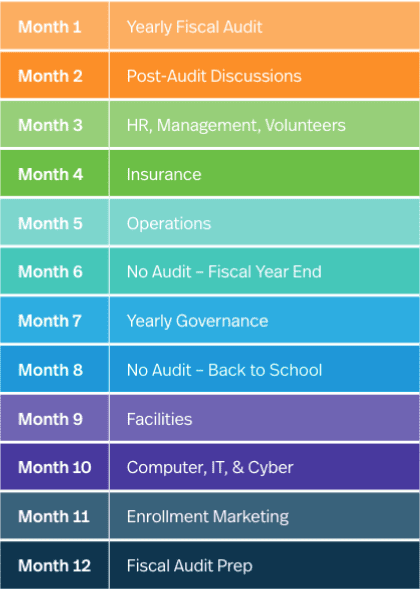The idea of the audit can invite stress, and it’s understandable to feel daunted by the need to address compliance and other issues while you’re focused on the day-to-day aspects of growing a school. The Charter School Audits Guide Preparing Your School for the Annual Audit offers month-by-month breakdowns schools can use to stave off overwhelm. The key is preparing a little bit at a time.
Here’s what the plan looks like:

As seen in the chart above, month one is dedicated to the fiscal audit overall. That’s because month one is when schools have just completed the previous year’s audit, so the first steps are about how to move forward from there.
For a detailed look at previous months, click the links below:
Month 1 – What do after your audit
Month 2 – Post-Audit Conversations
Month 6 – No Audit, Fiscal Year End
Month 7 is dedicated to your internal governance audit. Here are key areas to assess:
- Governing Policies and Procedures: Review your governing policies and procedures to ensure they align with the latest legal requirements and best practices. Take this opportunity to assess their effectiveness and make sure you have a clear framework in place that supports transparent decision-making and accountability.
- Conflict-of-Interest Policy: Examine your conflict-of-interest policy, which is not only required by authorizers and state regulations but also is a vital tool for maintaining integrity within your school. Ensure that it is comprehensive, up-to-date, and effectively addresses potential conflicts that may arise.
- Updating Existing Policies/Procedures: Evaluate any existing policies and procedures that may need revision or improvement. This includes things like student discipline, academic standards, financial management, and personnel policies.
- Board Resolution Calendar: Develop a board resolution calendar to facilitate ongoing adoption reviews at monthly board meetings. This calendar will help you keep track of important resolutions that need to be addressed and approved regularly, ensuring that necessary decisions are made in a timely manner.
- Board Committees and Calendar: Assess the effectiveness of your board committees and their alignment with the school’s strategic goals. Evaluate whether the committees are functioning optimally and whether their activities are adequately documented. Additionally, review your board calendar to ensure that meetings are scheduled strategically, allowing for productive discussions and decision-making.
- Organizing Meeting Documentation: Take steps to organize and centralize board meeting documentation, including agendas, minutes, and resolutions. Consider creating an annual binder for easy access and historical reference. Additionally, ensure that these documents are readily available on your school’s website.
By focusing on areas such as governing policies, conflict-of-interest policies, updating procedures, and organizing meeting documentation, you are actively fostering a culture of accountability and transparency. Insights gained will help guide your decision-making and promote continuous improvement in governance practices.
Want to take a closer look at the month-by-month audit prep plan? Download The Charter School Audits Guide Preparing Your School for the Annual Audit for free here!
